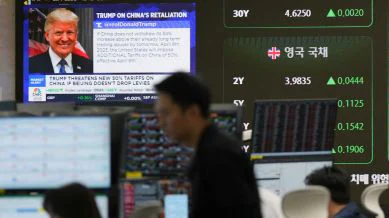Published on: April 8, 2025
The global economy is once again standing on edge, and the reason is a familiar one: tariffs. With U.S. President Donald Trump’s new round of tariffs on Chinese imports set to take effect tomorrow, tensions are running high across continents—from Beijing to Brussels, and from Wall Street to the global investor community.
What’s Happening?
Starting tomorrow, the U.S. will impose a 34% tariff on a significant volume of Chinese goods, a move that marks a sharp escalation in the long-standing trade dispute between the two economic giants. The Trump administration claims these measures are necessary to counter what it sees as unfair trade practices by China. But Beijing isn’t backing down.
In a swift response, China has announced its own set of retaliatory tariffs on U.S. goods, vowing to “fight to the end.” Chinese officials have accused the U.S. of “bullying” and undermining global trade rules.
Europe Caught in the Middle
Meanwhile, Europe is still consulting among member states, trying to decide how to respond. The European Union has offered to eliminate tariffs on industrial goods in a bid to calm the waters, but Trump has rejected the offer, insisting that Europe’s regulatory framework continues to harm American interests.
The market response in Europe has been dramatic. The Stoxx 600 index dropped 1.8%, with automakers taking a particularly hard hit. Stellantis and Mercedes-Benz, both reliant on international supply chains, were among the biggest losers, with auto stocks plunging 5.3%.
Market Reactions Worldwide
Across the globe, investors are watching the drama unfold with caution and anxiety. While U.S. and European markets have slipped, Asian markets have shown some resilience—possibly fueled by investor confidence in China’s long-term strategy.
Interestingly, some financial veterans believe China could come out stronger in the long run. Investor Mark Mobius, for instance, argued that China may benefit by diversifying its trade partners and potentially ignoring U.S. software patents to boost domestic innovation.
Why It Matters
This isn’t just a U.S.-China problem. These trade tensions have the power to disrupt global supply chains, raise prices for consumers, and dampen economic growth around the world. With tariffs kicking in and no compromise in sight, companies across all sectors—from tech to agriculture—are bracing for impact.
The Road Ahead
Whether this leads to a prolonged trade war or forces parties back to the negotiating table remains to be seen. What’s clear, though, is that this is more than just economic maneuvering. It’s a geopolitical chess match with far-reaching consequences.
As the tariffs become reality, all eyes will be on the global markets to see just how deep the ripple effects will go. Will this push countries toward greater economic independence? Or will it spark a new round of talks to prevent further damage?
One thing is certain: the world is watching, and the stakes are higher than ever.
Stay tuned for more updates as this story develops.

